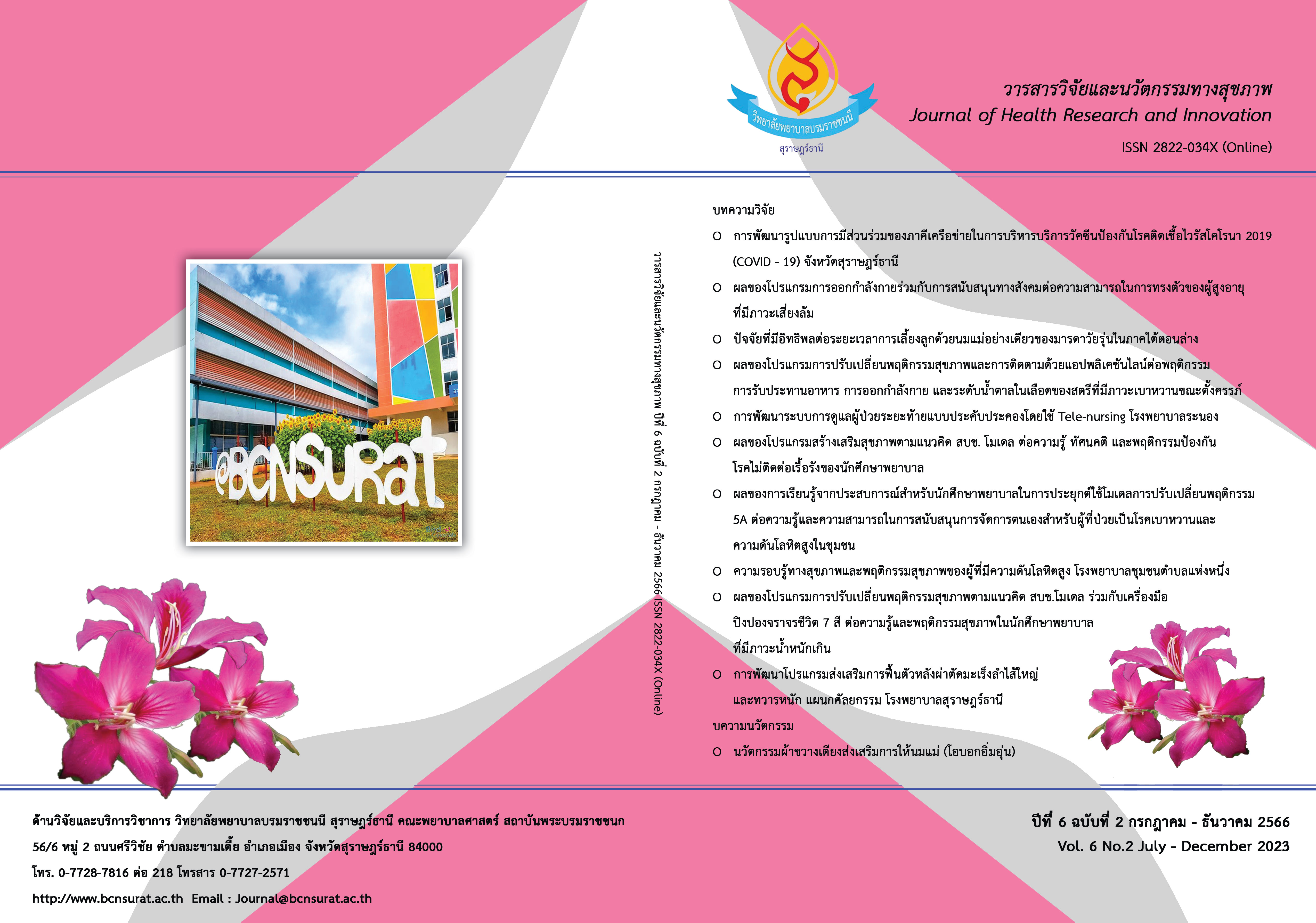ผลของโปรแกรมสร้างเสริมสุขภาพตามแนวคิด สบช. โมเดล ต่อความรู้ ทัศนคติ และพฤติกรรมป้องกันโรคไม่ติดต่อเรื้อรังของนักศึกษาพยาบาล
คำสำคัญ:
พฤติกรรมสร้างเสริมสุขภาพ, โรคไม่ติดต่อเรื้อรัง, ปิงปองจราจรชีวิต 7 สี, แนวคิด สบช. โมเดลบทคัดย่อ
พฤติกรรมสร้างเสริมสุขภาพที่เหมาะสมจะส่งผลให้มีภาวะสุขภาพดี และป้องกันการเกิดโรคไม่ติดต่อเรื้อรังได้ การวิจัยครั้งนี้เป็นการวิจัยกึ่งทดลอง มีวัตถุประสงค์เพื่อศึกษาผลของโปรแกรมสร้างเสริมสุขภาพตามแนวคิด สบช. โมเดล ต่อความรู้ ทัศนคติ และพฤติกรรมป้องกันโรคไม่ติดต่อเรื้อรังของนักศึกษาพยาบาล กลุ่มตัวอย่างคือ นักศึกษาหลักสูตรพยาบาลศาสตรบัณฑิต วิทยาลัยพยาบาลบรมราชชนนี พะเยา ชั้นปีที่ 1 ถึง 4 ปีการศึกษา 2565 จำนวน 401 คน เครื่องมือที่ใช้ในการวิจัย คือ 1) โปรแกรมสร้างเสริมสุขภาพตามแนวคิด สบช. โมเดล 2) แบบสอบถามความรู้เกี่ยวกับโรคไม่ติดต่อเรื้อรัง 3) แบบสอบถามทัศนคติต่อโรคไม่ติดต่อเรื้อรัง และ 4) แบบสอบถามพฤติกรรมการดูแลสุขภาพของนักศึกษาต่อโรคไม่ติดต่อเรื้อรัง ผ่านการตรวจสอบค่าดัชนีความตรงตามเนื้อหา จากผู้ทรงคุณวุฒิ จำนวน 3 ท่าน เท่ากับ 1, .89, .93 และ .84 ตามลำดับ ค่าความเชื่อมั่นของแบบทดสอบ ดังนี้แบบสอบถามความรู้เกี่ยวกับโรคไม่ติดต่อเรื้อรัง โดยวิธีคูเดอร์-ริชาร์ดสัน เท่ากับ .84 แบบสอบถามทัศนคติต่อโรคไม่ติดต่อเรื้อรัง และแบบสอบถามพฤติกรรมการดูแลสุขภาพของนักศึกษาต่อโรคไม่ติดต่อเรื้อรัง โดยสัมประสิทธิ์แอลฟาครอนบาค เท่ากับ .80 และ .84 ตามลำดับ วิเคราะห์ข้อมูลใช้สถิติเชิงพรรณนา และวิเคราะห์เปรียบเทียบโดยสถิติการทดสอบค่าทีสองกลุ่มสัมพันธ์
ผลการวิจัย พบว่า หลังการใช้โปรแกรมสร้างเสริมสุขภาพตามแนวคิด สบช. โมเดล กลุ่มตัวอย่างมีค่าเฉลี่ยคะแนนความรู้ ทัศนคติ และพฤติกรรมป้องกันโรคไม่ติดต่อเรื้อรัง สูงกว่าก่อนการใช้โปรแกรมสร้างเสริมสุขภาพตามแนวคิด สบช. โมเดล อย่างมีนัยสำคัญทางสถิติ (p<.01) ผลการวิจัยนี้เห็นได้ว่า โปรแกรมสร้างเสริมสุขภาพตามแนวคิด สบช. โมเดล เป็นการส่งเสริมให้นักศึกษามีความตระหนักในการดูแลสุขภาพของตนเอง ส่งผลในการลดจำนวนกลุ่มเสี่ยงและการเกิดภาวะแทรกซ้อนที่รุนแรงจากโรคไม่ติดต่อเรื้อรัง และเป็นการสร้างเสริมสุขภาพให้นักศึกษามีสุขภาพที่ดีอย่างยั่งยืน
เอกสารอ้างอิง
Aekplakorn, W., Puckcharern, H.& Satheannoppakao, W. (2021). Thai National Health Examination Survey, NHES VI 2019-2020. Faculty of Medicine Ramathibodi Hospital, Mahidol University. (In Thai)
A Yoh, N., Sittisart, V., Meethip, N., & Na Wichian S. (2022). The effectiveness of the enhancing Village Health Volunteer's competency program in high blood pressure screening according to the 7 colors of Vichai’s Model on knowledge, screening skills and advocacy for hypertension among village health volunteers. Journal of Nursing Division, 49(2), 12-22. (In Thai)
Burns, N., & Grove, S. (2009). The practice of nursing research: Appraisal, synthesis and generation of evidence (6th ed.). Saunders Elsevier, St. Louis.
Chamchan, D. (2022). Development of a Health Behavior Modification Model to Reduce the Incidence of Diabetes Among People at Risk of Diabetes Chonsomboon Sub-District Health Promoting Hospital Nongmuang District Lopburi Province. Department of health Service Support Journal, 18(3), 47-58.
Division of Non communicable Disease. (2021). Annual Epidemiological Surveillance Report 2021. Bangkok : Aksorn grphic and design publishing limited partnership. (In Thai)
Jugsingto, C., et al. (2017). Effectiveness of Health Behavior Modification for Program in High Risk Group for Diabetes Hypertension and Obesity. Master of Public Health. Chachoengsao: Rajabhat Rajanagarindra University. (In Thai)
Juwa, S., Wongwat, R.& Manoton, A. (2019). The Effectiveness of the Health Behavior Change Program with 7 Colors Ball Tool on Knowledge, Health Belief and Behavior Related to the Prevention and Control of Hypertension and Diabetes Mellitus, in Maeka Sub-District, Muang District, Phayao Province. Songklanagarind Journal of Nursing, 39(2), 127-141. (In Thai)
Kladthong, S., & Yamsakul, N. (2021). The effects of health literacy enhancement program according to 2 Aor. principles on health literacy, health behavior and blood sugar level of people with type 2 pre-diabetes mellitus. The Academic and Nursing Journal of Boromarajonani College of Nursing Chakriraj, 1(2), 14-26. (In Thai)
Nithitantiwat, P., & Udomsapaya, W. (2017). Food consumption behavior among Thaiadolescents, impacts, and solutions. Journal of Phrapokklao Nursing College, 28(1), 122-128. (In Thai)
Putthong, Ch., Suphannakul, P., & Noppakao S. (2018). Factors Related to Self-Care Behaviors using Thai Traditional Medicine and Alternative Medicine of Village Health Volunteers in Thung Saliam District, Sukhothai Province. Nursing Journal of The Ministry of Public Health, 28(3), 156–165. (In Thai)
Saentecha, P., & Lamluk P. (2020). The Effectiveness of a Program for Health Literacy Development in the Patients with Type 2 Diabetes. Thai Journal of Health Education, 43(2), 150-164. (In Thai)
Sarakshetrin, A., Sriyasak, A., Seangthong, W, & Khiewphet, W. (2022). The Effectiveness of Caloric Application on Food Consumption Behavior, and Body Weight for Overweight Nursing Students of Prachomklao College of Nursing, Phetchaburi Province. Journal of Health Research and Innovation, 5(2), 52-62. (In Thai)
Sridapeng, A., & Moonmuang, N. (2013). Health Promoting Behaviors of University Students. Journal of Liberal Arts Maejo University, 1(1), 59-86. (In Thai)
Sukdee, S. (2017). The Development of Health Behavior Modification Model for Non-communicable Chronic Diseases Risk Using Participatory Approach in the Community. Doctor of philosophy degree, Srinakharinwirot University, Thailand. (In Thai)
Suksai, P., & Jaruchart, T. (2022). Knowledge, Attitude, and Health Behaviors and Obesity of Students in Muang District, Phitsanulok Province. Christian university Journal, 28(3), 20-35. (in Thai)
Thianthavorn,V. (2013). Surveillance, control, prevention, diabetes, high blood pressure in Thailand. Bankok: Division of health education, department of health service support, Ministry of health Thailand; 2013. (In Thai)
Thianthavorn, V., Chuenkongkaew, W., Tanvatanakul, V., & Thepaksorn, P. (2022). Research Development and Health Innovations for the Health Promotion and PreventionforNon-Communicable Diseases (NCDs) under the Project to Build Healthy Communities with the PRBR Model 2022: 1 College, 1 Community in Honor of H.M. King Maha Vajiralongkorn Phra Vajiraklaochaoyuhua (2022 -2024). Thai Journal of Public Health and Health Sciences, 5(2), 187-194. (In Thai)
Vasuthada, C., Dechavoot, L., Jaikla, N., & Jarujit, S. (2018). The Relationship between Perception toward Non-communicable Diseases and Health Promotion Behaviors for Non-communicable Diseases Prevention among People in Muang District, Chanthaburi Province. Journal of Phrapokklao Nursing College, 29(2), 47–59. (In Thai)
World Health Organization. (2021). Non-communicable Diseases. May 16, 2023, Retrieved from https://www.who.int/news-room/fact-sheets/detail/noncommunicable-diseases
Wuttiwongchai, P., Thongwandee, P., & Wangnurat, B. (2017). Community Based Intervention for NCDs Controlling: CBI NCDs. Bangkok: Emotion Art. (In Thai)
ดาวน์โหลด
เผยแพร่แล้ว
รูปแบบการอ้างอิง
ฉบับ
ประเภทบทความ
สัญญาอนุญาต
ลิขสิทธิ์ (c) 2023 วิทยาลัยพยาบาลบรมราชชนนี สุราษฎร์ธานี

อนุญาตภายใต้เงื่อนไข Creative Commons Attribution-NonCommercial-NoDerivatives 4.0 International License.
บทความที่ได้รับการตีพิมพ์เป็นลิขสิทธิ์ของวารสารวิทยาลัยพยาบาลบรมราชชนนี สุราษฎร์ธานี
ข้อความที่ปรากฏในบทความแต่ละเรื่องในวารสารวิชาการนี้เป็นความคิดเห็นส่วนตัวของผู้เขียนแต่ละท่านไม่เกี่ยวข้องกับวิทยาลัยพยาบาลบรมราชชนนี สุราษฎร์ธานี และคณาจารย์ท่านอื่นๆในวิทยาลัยฯ แต่อย่างใด ความรับผิดชอบองค์ประกอบทั้งหมดของบทความแต่ละเรื่องเป็นของผู้เขียนแต่ละท่าน หากมีความผิดพลาดใดๆ ผู้เขียนแต่ละท่านจะรับผิดชอบบทความของตนเองแต่ผู้เดียว



